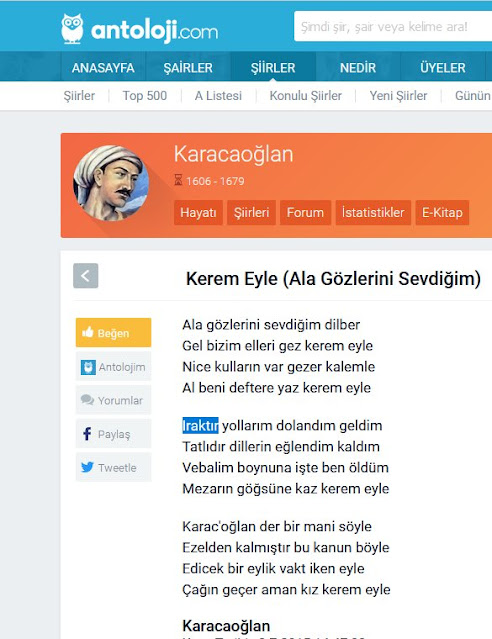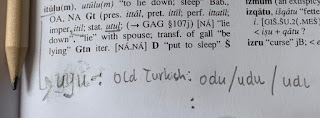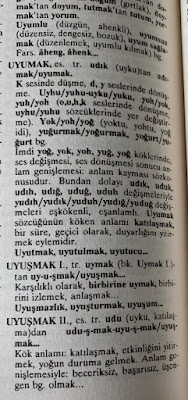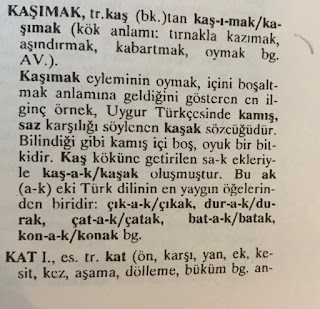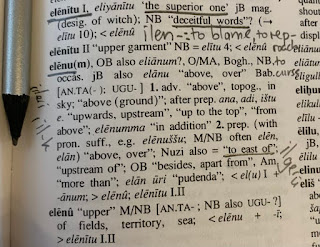Yıl 2001, 6. ay olmalı.
Babayla Manisa’ya gittiydik. Manisa kebap ısmarladıydı. Senin paran benim memlekette geçmez, dediydi. Manisa doğumlu değildi ama Manisalıydı. Bir işi için devlet dairesine girdiğinde, ordaki bahçedeki ağaçtan bikaç tohum aldıydım. Demek ağaç 20 yaşında.Akkadian Sumerian Etruscan Turukku ProtoTurkic Proto Turkic Scythian Sarmatian Thracian PreGreek Pre-Greek Carian Sidetic Luwian Lycian Lydian Asianic Kurmali Karoshthi Indus Script Paulys RE Indo European IndoEuropean IndoGerman Etymology Kelime Köken Kelimeköken Turkish Türk Proto Altaic Uralic No Main Stream Ideas No MainsStream Something New No Racism Against EuroCentrism No Euro Centrism! I'm looking at the things through the Turkic window! * Türkic names in Pliny Strabon Homer Pauly RE
Saturday, September 25, 2021
Akasya-Agaci-Babam-ve-Ben
Akkadian-Turkish-Assyrian-Sumerian-Words
Akkadian word of the day
Kungu Kungu 1: a kind of house Compare Old Turkish konağ/konğu>konak A place to stay for a short time. Konuk: guest * Kungu 2: a kind of rush(reed) Konak/konag: millet, Timothy(grass) Turkish kaba darı Sources: Gülensoy/starling.rinet.ru*
 )?
>Gebeş: a person with a fat belly
)?
>Gebeş: a person with a fat bellySidetic-Carian-Turkish-Alphabets
 |
| Sidetic Alphabet - Turkish Runes - similarity startling and tantalizing |
Sidetic is a right-to-left alphabet (like Old Turkish) that was used during the 2nd C BC in Side, today‘s Türkiye!
I compared this ‚origin unknown‘ alphabet with Runes!
Startling similarities!
Not only the shape but also the sound. Look at ‚|‘which inTurkish and Sidetic ‚S‘.
Runes!
Startling similarities!
Not only the shape but also the sound. Look at ‚|‘which inTurkish and Sidetic ‚S‘. Akkadian-Turkish-Hittite-Sumerian-Old-English-Words
Akkadian word/s of the day (25 Sept 2021 - Twitter) Piāqum/piqu(pūqu): to make narrow; narrow, tight, strangulation?; piqatu: narrow places * Look at the Old Turkish word
Bük (v)(n): to bend, twist; corner, strangulation, thicket >English
buxus: German Buchsbaum
*
2 Hunnic leaders (5. C) whose names are related to horses: Donatus and Charaton: * Donatus from the word 'horse' > yonat - yunt Charaton from the color of the horse - black colored <don: the color of the horse * Turkish language is older than 7th CE!
*
Akkadian word of the day Pāštu/paltu: axe, adze Look at the Old Turkish word Baltu/paltu: axe, adze Hungarian balta: axe, adze Same? Same. * Read Gülensoy‘s explnation about the etymo of the word!
*
2. Akkadian word of the evening Parakku: cult dais, sanctuary, chapel, shrine * Look at the Old Turkish word Bark: sanctuary, memorial, monument
*
Akkadian words of the evening *Pāna u arka* meaning ‚before and behind‘ Look at Old Turkish words *Ön? (ve) arka* meaning ‚before (and) behind‘
Same? same...
 |
| akkadian pana u arka = Turkish ön ve arka = German vorne und hinten |
*
Akkadian verbs of the day
Nakû: to pour, shed tears, shed blood
Nâku: to run, go
*
Compare the (Old & Modern) Turkish verb
Ak- 1: to pour, to flow, shed tear, shed blood
Ak- 2: to run, to go, to raid, to sweep >Akın: raid
*
This time a Turkish word in EUROPEAN langs PEKMEZ
Öztürkçe Pekmez’imiz de Türk kültürünün gittiği yere götürülmüştür! Rumanya, Sırbistan ve Macarstan üçgenindeki Banat bölgesinden kişisel bir saptamada görüleceği üzere! Bende katkı: 2 görüş, pekmez’in kelimekökeni hakkında, Eyuboğlu ve Gülensoy
*
From Twitter
*
Compare Old Turkish yığaç ... ağaç << ETü yıġaç ağaç - iǧč /ïɣač All meaning tree or wood /pic 1 * Pic 2 / Sumerian Giş, meaning wood, as prefix for sth made of wood
* How can be denied that Turkish and Akkadian are not related!? Look at the Akkadian word of the day Makru(m) red, red spot, the name of the Planet *Mars* Old Turkish bakır: copper, the name of the Pl. *Mars* Nişanyan himself asks if Bakır is the original version of IndoEuro KPR?
*
Akkadian word of the day
(page 430)
Utunu [UDUN] : kiln (a kind of oven)<—-Sumerian
*
Compare the Turkish/Mongolian words
Odun: a tree cut into pieces for burning < od/ot= fire






*
Turkish Rune for Y has the shape of a bow
Turkish word for bow = YAY
*
Uzunbacak Adem
Beekes-Pre-Greek-and-Tuerkic
Robert Beekes - Pre-Greek Lexicon * Robert Stephen Paul Beekes is THE leading expert on Indo-European and Pre-Greek. I have searched and ...

-
* Here below some Scythian and Thracian toponyms and andronyms that could have a Türkic etymologies: * Name Who/What Old Türkish equivalen...
-
Pic: wikipedia * There are many Argos in Greek mythology. The two most important ones for our topic are the dog Argos and toponym Argos. L...
-
Payava tomb front inscription by wikipedia * Lycian people, the allies of the Troyan against Achaeans. We don't know much about them. ...









